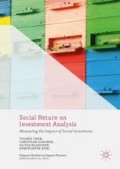Abstract
Organisations develop an interest in social impact analyses in general or in an SROI analysis specifically: first, because they want to improve their external communication ; second, in reaction to a comprehensive trend towards social impact analyses; and third, because they have a strategic interest in further development towards impact orientation.
Access this chapter
Tax calculation will be finalised at checkout
Purchases are for personal use only
Notes
- 1.
We would like to thank Robert Münscher who made important contributions to the previous German version of this chapter.
- 2.
See, e.g., the comparative evaluation of studies published between 2002 and 2012 by Krlev et al. (2013).
References
Alliance. (n.d.). The alliance for useful evidence. http://www.alliance4usefulevidence.org. Accessed September 07, 2017.
Arvidson, M., Lyon, F., McKay, S., & Moro, D. (2010). The ambitions and challenges of SROI (Working Paper 49). Birmingham: TSRC.
Cascio, W., & Boudreau, J. (2011). Investing in people. Financial impact of human resource initiatives (2nd ed.). Upper Saddle River, NJ: Pearson Education.
Ebrahim, A., & Rangan, V. K. (2014). What impact? A framework for measuring the scale and scope of social performance. California Management Review, 56(3), 118–141.
Harlock, J. (2013). Impact measurement practice in the UK third sector: A review of emerging evidence (Working Paper 106). Birmingham: University of Birmingham.
Hattie, J. (2008). Visible learning. A synthesis of over 800 meta-analyses relating to achievement. London: Routledge.
Jacobi, L., & Kluve, J. (2007). Before and after the Hartz reforms. Zeitschrift für Arbeitsmarktforschung, 40(1), 45–64.
J-PAL. (n.d.). Abdul Latif Jameel Poverty Action Lab. https://www.povertyactionlab.org. Accessed September 07, 2017.
Krlev, G., Münscher, R., & Mülbert, K. (2013). Social return on investment (SROI). State-of-the-art and perspectives. A meta-analysis of practice in social return on investment (SROI) studies published 2002–2012. Heidelberg: Centre for Social Investment, Heidelberg University.
Lechner, A., Kössl, E., & Horner, L. (2010). Spenden Sie Ihre alte Waschmaschine. Reparatur- und Service-Zentrum GmbH. Unpublished Term Paper. Vienna: Vienna University of Economics and Business.
Maier, F., Schober, C., Simsa, R., & Millner, R. (2015). SROI as a method for evaluation research. Understanding merits and limitations. VOLUNTAS: International Journal of Voluntary and Nonprofit Organizations, 26(5), 1805–1830.
Mook, L., Maiorano, J., Ryan, S., Armstrong, A., & Quarter, J. (2015). Turning social return on investment on its head. Nonprofit Management and Leadership, 26(2), 229–246.
New Philanthropy Capital. (2010). Social return on investment. Position Paper. London: New Philanthropy Capital.
Nicholls, J., Lawlor, E., Neitzert, E., & Goodspeed, T. (2012). A guide to social return on investment. Updated version. Cabinet Office, Office of the Third Sector.
Rousseau, D. M. (2006). Is there such a thing as “evidence-based management”? Academy of Management Review, 31(2), 256–269.
Schober, C., & Rauscher, O. (2011). SROI-Analyse des‚ ‘Ideen-gegen-Armut’ Siegerprojekts 2009. Spenden Sie Ihre alte Waschmaschine. Project Report. Vienna: Competence Center for Nonprofit Organisations and Social Entrepreneurship, Vienna University of Economics and Business.
Thaller, A., & Geppl, M. M. (2010). Handbuch Wirkungsorientierte Steuerung. Unser Handeln erzeugt Wirkung. Handbook, Version 3.0. Vienna: Bundesministerin für Frauen und Öffentlichen Dienst im Bundeskanzleramt Österreich.
Then, V., Münscher, R., Stahlschmidt, S., & Knust, R. (2014). Studie zu den Effekten betrieblicher Kinderbetreuung. Ein CSI Bericht unter Verwendung des Social Return on Investment. Report. Heidelberg: Centre for Social Investment, Heidelberg University.
Author information
Authors and Affiliations
Corresponding author
Rights and permissions
Copyright information
© 2017 The Author(s)
About this chapter
Cite this chapter
Then, V., Schober, C., Rauscher, O., Kehl, K. (2017). What Interests Do Organisations Pursue with an Impact Analysis? A Guide. In: Social Return on Investment Analysis. Palgrave Studies in Impact Finance. Palgrave Macmillan, Cham. https://doi.org/10.1007/978-3-319-71401-1_2
Download citation
DOI: https://doi.org/10.1007/978-3-319-71401-1_2
Published:
Publisher Name: Palgrave Macmillan, Cham
Print ISBN: 978-3-319-71400-4
Online ISBN: 978-3-319-71401-1
eBook Packages: Economics and FinanceEconomics and Finance (R0)

